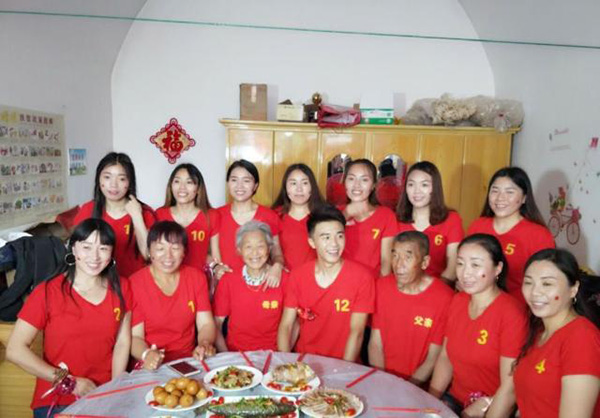Chinese Corner: ‘Brother-assisting demons,’ the rise of moral policing, and dating shows as performance art
Chinese Corner: ‘Brother-assisting demons,’ the rise of moral policing, and dating shows as performance art

Family love or sacrifice: How to explain the deeds of ‘brother-assisting demons’
11个姐姐帮助弟弟结婚:是家庭和睦还是重男轻女思想下的单向索取?| 思想界
By 傅适野 | 界面文化
July 16, 2018
Last week, we covered an extremely jarring story of 11 sisters in Shanxi Province collectively funding the marriage of their younger brother, who is the only male child in their family. While one of the sisters stressed in an interview that they chose to offer financial help out of their own accord, and that their parents never favored the son over them, the Chinese internet lashed out in disbelief.
11 sisters help Shanxi man get married. Chinese internet says, ‘Wait, what?’
The firestorm of online criticism, however, makes little sense to commenter Zhang Feng 张丰, who argues in an article from the ThePaper.cn that gender plays no role in this story. According to Zhang, since the 1990s, having a large family has been the norm in rural China, as more and more country people have been migrating to urban areas in search of job opportunities. Unlike middle-class families in urban China, those living in the countryside tend to focus more on family bonding and persist in the tradition of taking on the burdens of other family members. As to “brother-assisting demons,” the nickname that internet users gave to the 11 sisters, Zhang argues that it exemplifies the decline of traditional family values, which attaches great importance to unconditional love, compassion, affection, and kindness. “The rhetoric implies a distorted value of self-dependence and apathy. In the context of a family, it means offering no help to other family members under any circumstances and not asking for help in return. This notion is prevalent in urban China,” Zhang wrote.
In a rebuttal to Zhang’s arguments, blogger Cong Yi 从易 published an article titled “Family help is not asking women to make a sacrifice for the sake of men,” saying that berating those who are critical of the family for selfishness is entirely beside the point. Cong insists that the conversation should center on the regressive culture of male preference in China, as millions of Chinese women remain victims of gender inequality. Agreeing with Cong, blogger Hou Hongbin 侯虹斌 comments that the most alarming part of this story is that the 11 sisters are unaware that they are complicit in this toxic culture. “They were taught that their values depend on how much they can contribute to the youngest brother. Their relationships with the brother are like 11 hosts and a parasite.”


The rise of moral policing among Chinese movie reviewers
《英国病人》《钢琴课》“毁三观”?豆瓣短评里的道德景观与现实焦虑
By 张之琪 | 界面文化
July 17, 2018
Earlier this month, The English Patient, the wartime romance story by Michael Ondaatje, was named the winner of the Golden Man Booker Prize, crowned as the best work of fiction from the last five decades of the prize. Despite being an instant classic of literature, the movie adapted from the book has been subject to extra ethical scrutiny on the Chinese movie review site Douban, as users argue that the extramarital love affair portrayed in the story is an inexcusable glorification of immorality.
In fact, The English Patient is far from the only movie condemned for its “incorrect worldviews” by Chinese movie reviewers. On Douban, the female protagonists are often the targets. Ada McGrath in The Piano is slammed for cheating on her husband, even though she is the victim in a forced marriage. Emma Bovary of Madame Bovary is criticized for her obsession with wealth, even though that leads to her suicide. Anna Karenina, unsurprisingly, is denounced for her infidelity. The emergence of applying ethical judgements on works of fictional art, as Zhang Zhiqi 张之琪 points out in this well-argued essay, reflects a new form of “political correctness” in China, where families are the glue that holds the fabric of society together, passionate love should be oppressed, and women are deprived of desires.


How dating shows in China have been reduced to performance art
电视相亲的浪漫消亡史
By 老妈蹄花 | X博士
July 18, 2018
It’s hard to remember a time in recent memory when dating shows felt genuine. Today, all we have are performative contestants who appear on television not to look for love, but to boost their social media following. That said, on Chinese television, there used to be some dating shows where contestants were average people who didn’t fit into any easily-identifiable stereotype and were there for the right reasons. This article walks us through the vibrant history of Chinese dating shows, ranging from the first one in 1988, which was lauded as a pioneer in defiance of arranged marriage, to the recent ones that feel more soulless than swiping through dating apps.


Father of three sons with autism
孤独的三次方
By 袁贻辰 | 冰点周刊
July 19, 2018
Autism is a grueling diagnosis for any parent. For Liu Hongqi 刘洪起, it’s difficulty times three. In this feature story, Yuan Yichen 袁贻辰 at Bingdian Weekly 冰点周刊 tells the depressing story of Liu, a single father who is struggling to care for his autistic triplets who just turned 17. The account shows how demanding it is, financially and mentally, to tend to autism-related treatments and needs, and how little help the government and society offer parents like Liu.






